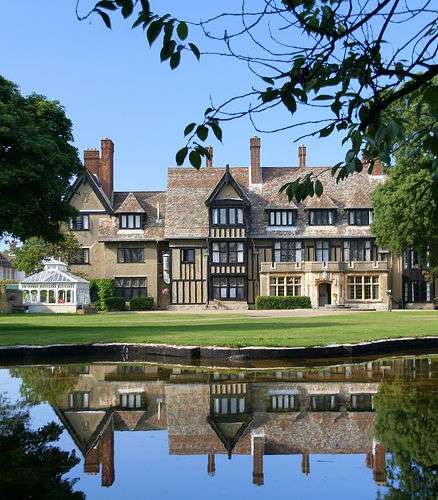Sizewell Hall
Sizewell Hall is a Christian conference centre in Sizewell on the Suffolk coast, England. The estate is owned by the Ogilvie family.[1] It was for some time the home of a progressive school. It has historical connections with a classic taxidermy collection.
The present Christian conference centre is run by Sizewell Hall Ltd, a registered charity.[2] In 2007, 6500 visitors came to stay there, mainly local church groups from East Anglia, national organisations, and a local youth organisation CYM from Ipswich. CYM has developed an activity holiday for school children in the African Village[3] in the Hall grounds.
History

The Ogilvie family purchased the property in 1859 and expanded the estate to more than 6,000 acres (24 km2), and extended the house. Mrs Margaret Ogilvie was a benefactress who established a research award (Readership in ophthalmology) at Oxford University From this house, not far from RSPB Minsmere, the ophthalmic surgeon Fergus Menteith Ogilvie (1861–1918)[4] formed the very large Collection of British Birds which, in a celebrated partnership with the taxidermist Thomas Gunn of Norwich, were mounted in cases with unusually beautiful simulated habitats.[5] The collection (now in Ipswich Museum) is considered the best of its kind in Great Britain.[6] The Hall was rebuilt after a fire in 1920. Glencairn Stuart Ogilvie developed nearby Thorpeness. The Ogilvie family moved out when the army commandeered the hall in World War II.
After the War, it became a private school run by a Dutch Quaker, Harry Tuyn. One of his famous students was Sheridan Morley. The school closed in 1955. The school was a progressive, co-educational establishment where it was said that pupils could study what they liked, if they liked. (It is not to be confused with the progressive Summerhill School at Leiston nearby). It was said that subjects such as Geography, Maths and Latin were not taught at all on the ground that they were too boring.[7] However this cannot be true, because it was a copy of Kennedy's Latin Primer from Sizewell Hall School which gave to Benjamin Britten and Myfanwy Piper the words for Miles's Latin benedicite in Britten's opera The Turn of the Screw.[8][9]
In the 1960s the Hall was the headquarters for Taylor Woodrow as they were constructing Sizewell A nuclear power Station.[10]
Sizewell Hall was used as a location for the television adaptation of The Lost Prince[11] and for Lovejoy.
The grounds of the hall include the camping site, a children's park, tennis courts, a sports hall, a squash court and an activity course.
External links
References
- ↑ Burke's Peerage - Preview Family Record Archived November 20, 2007, at the Wayback Machine.
- ↑ Extract from the Central Register of Charities maintained by the Charity Commission for England and Wales
- ↑ CYM - African Adventure Archived January 29, 2008, at the Wayback Machine.
- ↑ Obituary, British Medical Journal Feb. 2 1918, p. 164 .
- ↑ Biography and sample images, .
- ↑ See Foreword by Howard Mendel (Natural History Museum) in C. Frost, The Ogilvie Bird Collection, An Illustrated Guide (120pp., Long Melford 1989), p. 7. (ISBN 0-9512263-2-0): cf also G. Maynard, Guide to the Ogilvie Collection of British Birds (104 pp., Ipswich Corporation Museum, Ipswich 1938), 3-5. Online article "Archived copy". Archived from the original on 2008-10-15. Retrieved 2008-06-21.
- ↑ "Sheridan Morley". The Daily Telegraph. London. 2007-02-17. Retrieved 2010-05-23.
- ↑ Valentine Cunningham (2002-01-05). "Filthy Britten". The Guardian. London. Retrieved 2008-06-28.
- ↑ Christopher Stray 'Kennedy's Latin primer in Britten's "Turn of the Screw"'. Paradigm 2.6 (2003), 9-13
- ↑ Power Houses
- ↑ Masterpiece Theatre | The Lost Prince | Production Notes | Locations
Coordinates: 52°12′03″N 1°37′15″E / 52.2007°N 1.6209°E